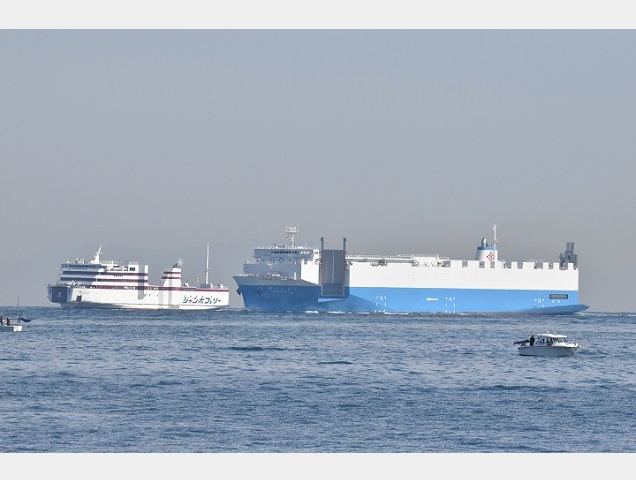Research News
Apr 15, 2025
- Engineering
Explainable AI for ship navigation raises trust, decreases human error
New AI model explains the basis for its decisions and the intention behind actions
Close encounters
A passenger ferry, left, and a cargo ship sail the Akashi Strait in Japan.
Credit: Yoshiho Ikeda, Professor Emeritus, Osaka Prefecture University

The Titanic sunk 113 years ago on April 14-15, after hitting an iceberg, with human error likely causing the ship to stray into those dangerous waters. Today, autonomous systems built on artificial intelligence can help ships avoid such accidents, but could such a system explain to the captain why it was maneuvering a certain way?
That’s the idea behind explainable AI, which should help human actors trust autonomous systems more. Researchers from Osaka Metropolitan University’s Graduate School of Engineering have developed an explainable AI model for ships that quantifies the collision risk for all vessels in a given area, an important feature as key sea-lanes have become ever more congested.
Graduate student Hitoshi Yoshioka and Professor Hirotada Hashimoto created the AI model so that it explains the basis for its decisions and the intention behind actions using numerical values for collision risk.
“By being able to explain the basis for the judgments and behavioral intentions of AI-based autonomous ship navigation, I think we can earn the trust of maritime workers,” Professor Hashimoto stated. “I also believe that this research can contribute to the realization of unmanned ships.”
The findings were published in Applied Ocean Research.
Funding
This work was conducted in collaboration with ClassNK and was supported by JST SPRING Grant Number JPMJSP2139 and JSPS KAKENHI Grant Number 23H01627.
Paper information
Journal: Applied Ocean Research
Title: Explainable AI for ship collision avoidance: Decoding decision-making processes and behavioral intentions
DOI: 10.1016/j.apor.2025.104471
Authors: Hitoshi Yoshioka, Hirotada Hashimoto
Published: 21 February 2025
URL: https://doi.org/10.1016/j.apor.2025.104471
Contact
Hirotada Hashimoto
Graduate School of Engineering
Email: hashimoto.marine[at] omu.ac.jp
*Please change [at] to @.
SDGs
